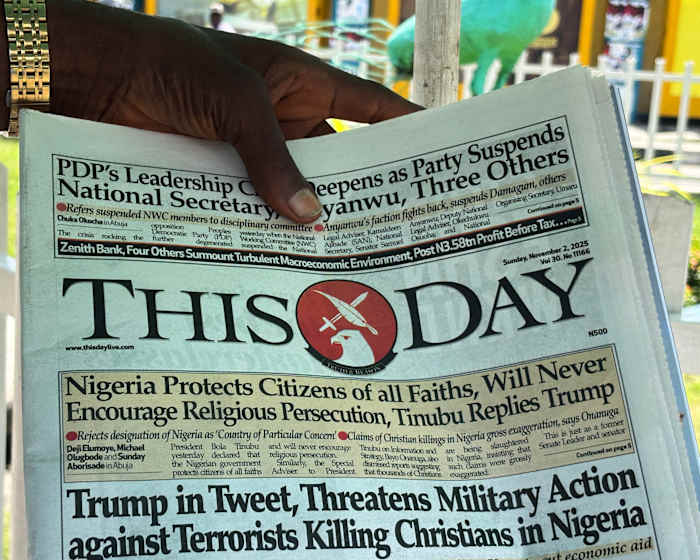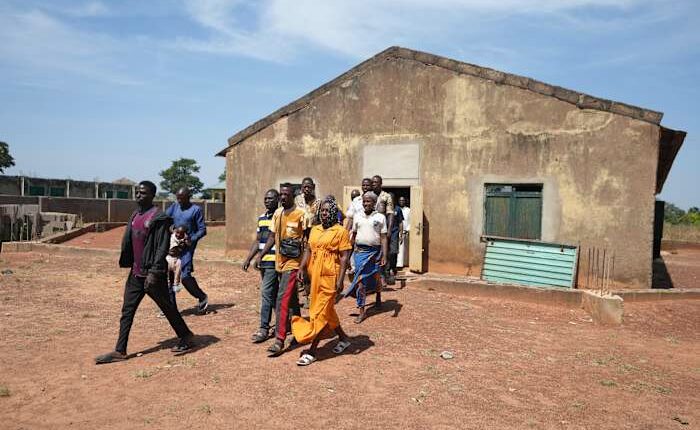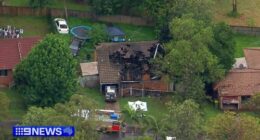Share this @internewscast.com

WASHINGTON – The Trump administration is actively seeking to collaborate with the Nigerian government to address violence against Christians, signaling a broader strategy following President Trump’s directive for potential military intervention. Trump has previously suggested the U.S. might intervene forcefully to eliminate Islamic militants.
According to a recent statement from a State Department official, the strategy encompasses more than just military options. It includes a wide array of diplomatic measures, such as possible sanctions, as well as support programs and intelligence cooperation with Nigeria.
Defense Secretary Pete Hegseth recently engaged with Nigeria’s national security adviser to explore ways to curb the violence. He shared images on social media where the two are seen shaking hands and smiling, which contrasts sharply with Trump’s earlier threats to halt all aid to Nigeria if it “continues to allow the killing of Christians.”
This initiative aligns with Trump’s promise to reduce foreign conflict involvement and is happening amidst a reduced U.S. military presence in Africa. Any military action in Nigeria would likely require redeployment of American forces from other regions.
Despite this, President Trump remains firm on exerting pressure as Nigeria continues to experience attacks on schools and churches, incidents that experts and locals say affect both Christians and Muslims.
During an interview on the “Brian Kilmeade Show” on Fox News Radio, Trump expressed his frustration, stating, “I’m really angry about it.” He criticized the Nigerian government for its inaction, labeling the situation as “a disgrace.”
The Nigerian government has rejected his claims.
A comprehensive approach
Following his meeting Thursday with Nigerian national security adviser Mallam Nuhu Ribadu, Hegseth on Friday posted on social media that the Pentagon is “working aggressively with Nigeria to end the persecution of Christians by jihadist terrorists.”
“Hegseth emphasized the need for Nigeria to demonstrate commitment and take both urgent and enduring action to stop violence against Christians and conveyed the Department’s desire to work by, with, and through Nigeria to deter and degrade terrorists that threaten the United States,” the Pentagon said in a statement.
Jonathan Pratt, who leads the State Department’s Bureau of African Affairs, told lawmakers Thursday that “possible Department of War engagement” is part of the larger plan, while the issue has been discussed by the National Security Council, an arm of the White House that advises the president on national security and foreign policy.
But Pratt described a wide-ranging approach at a congressional hearing about Trump’s recent designation of Nigeria as “a country of particular concern” over religious freedom, which opens the door for sanctions.
“This would span from security to policing to economic,” he said. “We want to look at all of these tools and have a comprehensive strategy to get the best result possible.”
Nigeria’s violence ‘will not be reversed overnight’
The violence in Nigeria is far more complex than Trump has portrayed, with militant Islamist groups like Boko Haram killing both Christians and Muslims. At the same time, mainly Muslim herders and mostly Christian farmers have been fighting over land and water. Armed bandits who are motivated more by money than religion also are carrying out abductions for ransom, with schools being a popular target.
In two mass abductions at schools this past week, students were kidnapped from a Catholic school Friday and others taken days earlier from a school in a Muslim-majority town. In a separate attack, gunmen killed two people at a church and abducted several worshippers.
The situation has drawn increasing global attention. Rapper Nicki Minaj spoke at a U.N. event organized by the U.S., saying “no group should ever be persecuted for practicing their religion.”
If the Trump administration did decide to organize an intervention, the departure of U.S. forces from neighboring Niger and their forced eviction from a French base near Chad’s capital last year have left fewer resources in the region.
Options include mobilizing resources from far-flung Djibouti in the Horn of Africa and from smaller, temporary hubs known as cooperative security locations. U.S. forces are operating in those places for specific missions, in conjunction with countries such as Ghana and Senegal, and likely aren’t big enough for an operation in Nigeria.
The region also has become a diplomatic black hole following a series of coups that rocked West Africa, leading military juntas to push out former Western partners. In Mali, senior American officials are now trying to reengage the junta.
Even if the U.S. military redirects forces and assets to strike inside Nigeria, some experts question how effective military action would be.
Judd Devermont, a senior adviser of the Africa program for the Center for Strategic and International Studies, said if Trump orders a few performative airstrikes, they would likely fail to degrade the Islamic militants who have been killing Christians and Muslims alike.
“Nigeria’s struggles with insecurity are decades in the making,” said Devermont, who was senior director for African affairs at the National Security Council under Democratic President Joe Biden. “It will not be reversed overnight by an influx of U.S. resources.”
Addressing the violence would require programs such as economic and interfaith partnerships as well as more robust policing, Devermont said, adding that U.S. involvement would require Nigeria’s cooperation.
“This is not a policy of neglect by the Nigerian government — it’s a problem of capacity,” Devermont said. “The federal government does not want to see its citizens being killed by Boko Haram and doesn’t want to see sectarian violence spiral out the way it has.”
US intervention carries risk
The Nigerian government rejected unilateral military intervention but said it welcomes help fighting armed groups.
Boko Haram and its splinter group, Islamic State of West Africa Province, have been waging a devastating Islamist insurgency in the northeastern region and the Lake Chad region, Africa’s largest basin. Militants often crisscross the lake on fast-moving boats, spilling the crisis into border countries like Chad, Cameroon and Niger.
U.S. intervention without coordinating with the Nigerian government would carry enormous danger.
“The consequences are that if the U.S deploys troops on the ground without understanding the context they are in, it poses risks to the troops,” said Malik Samuel, a security researcher at Good Governance Africa.
Nigeria’s own aerial assaults on armed groups have routinely resulted in accidental airstrikes that have killed civilians.
To get targeting right, the governments need a clear picture of the overlapping causes of farmer-herder conflict and banditry in border areas. Misreading the situation could send violence spilling over into neighboring countries, Samuel added.
___
Adetayo reported from Lagos, Nigeria, and Metz from Rabat, Morocco.
Copyright 2025 The Associated Press. All rights reserved. This material may not be published, broadcast, rewritten or redistributed without permission.












